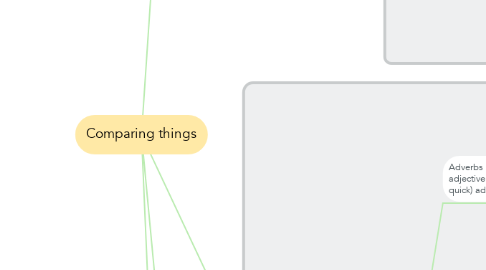
1. comparing adjectives
1.1. comparative adjectvies
1.1.1. usages
1.1.1.1. to compare two or more things, people or places
1.1.1.1.1. Ex: Younger runners will always be faster than older runners
1.1.1.2. to compare the same thing, person or place at two different times
1.1.1.2.1. Ex: I'm much fitter than I was last year
1.1.2. form
1.1.2.1. noun (subject) + verb + comperative adjective + than+ noun (object)
1.1.2.1.1. Ex: This is the smallest box I've ever seen
1.1.2.2. Note: sometimes we leave out the "than" clause if it is clear from the context what we are comparing something with
1.1.2.2.1. Ex: Older athletes are getting faster and fitter
1.1.3. rules of change
1.1.3.1. one syllable: adjective+ er
1.1.3.1.1. Ex: hard -> harder
1.1.3.2. one syllable ending in vowel+ consonant: last consonant doubled+ er
1.1.3.2.1. Ex: fat -> fatter
1.1.3.3. one syllable ending in "e": adjective+ r
1.1.3.3.1. Ex: nice -> nicer
1.1.3.4. two syllable ending in "y":leave y+ ier
1.1.3.4.1. Ex: happy -> happier
1.1.3.5. two or more syllables: more+ adjective
1.1.3.5.1. Ex: enjoyable -> more enjoyable
1.1.3.6. irregular: good -> better ; bad -> worse ; far -> further/farther
1.2. superlative adjectives
1.2.1. usages
1.2.1.1. to compare one thing in a group with all the others in that group
1.2.1.1.1. Ex: My house is the largest one in our neighborhood
1.2.2. form
1.2.2.1. noun (subject) + verb + the + superlative adjective + noun (object)
1.2.2.1.1. Ex: This is the smallest box I've ever seen
1.2.3. modifications
1.2.3.1. can modify superlatives with: one of the/ some of the+ superlative+ plural noun
1.2.3.1.1. Ex: Macy is one of the most generous people I know
1.2.3.2. can modify superlatives with ordinal numbers
1.2.3.2.1. Ex: Our team was the third best in the competition
1.2.3.3. can replace "the" with a possessive
1.2.3.3.1. Ex: My best friend is beautiful girl
1.2.4. rules of change
1.2.4.1. one syllable: the+ adjective+ est
1.2.4.1.1. Ex: hard -> the hardest
1.2.4.2. one syllable ending in "e": the+ adjective+ st
1.2.4.2.1. Ex: nice -> the nicest
1.2.4.3. one syllable ending in vowel+ consonant: the+ adjective+ consonant doubled+ est
1.2.4.3.1. Ex: fat -> the fattest
1.2.4.4. two syllables ending in "y": the+ adjective (leave y)+ iest
1.2.4.4.1. Ex: happy -> the happiest
1.2.4.5. two or more syllables: the most+ adjective
1.2.4.5.1. Ex: enjoyable -> the most enjoyable
1.2.4.6. irregular: good -> the best ; bad -> the worst ; far -> the furthest/ the farthest
2. Comparing adverbs
2.1. Adverbs that have the same form as the adjective (hard,fast, straight, late, early, quick) add "er/est"
2.1.1. Ex: Women aged 60 to 68 run on average four minutes faster each year
2.2. We can compare how things are done by using more/most+ adverbs
2.2.1. Ex: Women aged 60 to 68 improved the most markedly
2.3. some irregular adverbs ( well, better, badly, worse,...)
2.3.1. Ex: We need to treat the environment more carefully
3. Other ways of comparing
3.1. comparatives less
3.1.1. less
3.1.1.1. form: S+ verb+ less+ adv+ than+ S/N/ pronoun
3.1.1.2. Ex: In my opinion, Math is less interesting than English
3.1.2. the least
3.1.2.1. form: S+ be+ the least+ adj/adv
3.1.2.2. Ex: The room is the least comfortable
3.1.3. (not) as...as..
3.1.3.1. form: S+ V+ (not) as+ adj/adv/as+ N/pronoun
3.1.3.2. Ex: She sings not so well as her brother
3.2. repeated comparative
3.2.1. form
3.2.1.1. adj/adv+ er and adj/adv+er
3.2.1.2. more and more+ adj/adv
3.2.2. Ex: You are younger and younger/ She becomes more and more beautiful
3.3. double comparatives
3.3.1. form: the+ comparative+ S+ V, the comparative+ S+V
3.3.2. Ex: The less money I spend, the less I have to worry about saving
3.4. with words like even, far, a little+ comparative
3.4.1. Noun (subject) + verb + comparative adjective + than + noun (object).
3.4.2. Ex: Older women showed much greater increases in speed than expected
4. Comparing quantities
4.1. comparative
4.1.1. a lot/ much/ many -> more
4.1.2. a few -> fewer (+plural countable noun)
4.1.3. a little -> less (+uncountable noun)
4.2. superlatives
4.2.1. a lot/ much/ many -> the most
4.2.2. a few -> the fewest
4.2.3. a little -> the least
4.3. for plural or uncountable nouns we can compare quantities with "more" or "most"
4.3.1. Ex: Today's top sportspeople receive a lot more money than in the past
4.4. we can use "fewer" or "the fewest" with plural countable nouns, and "less" or "the least" with uncountable nouns
4.4.1. Ex: 25 years ago few 60-year-old men and even fewer women would have considered running a marathon
4.5. We can add emphasis
4.5.1. with a lot/ many+ more/ fewer+ plural countable noun
4.5.1.1. Ex: Increased sponsorship has given today's athletes many more opportunities to succeed
4.5.2. with a lot/ much+ more/ less+ uncountable noun
4.5.2.1. Ex: Today's athletes need to do much more training than in the past
4.5.3. by repeating more/ less/ fewer
4.5.3.1. Ex: So much in our society is about making more and more money
4.6. We can say something is the same or different using (not) as many/much+ plural/uncountable noun(+as)
4.6.1. Ex: There aren't as many people doing sports at school (as there used to be)
4.7. We can add more specific information about quantity by using half/twicce/three times... with as many/much..as
4.7.1. Ex: In 2004 China won nearly twice as many silver medals as the US
